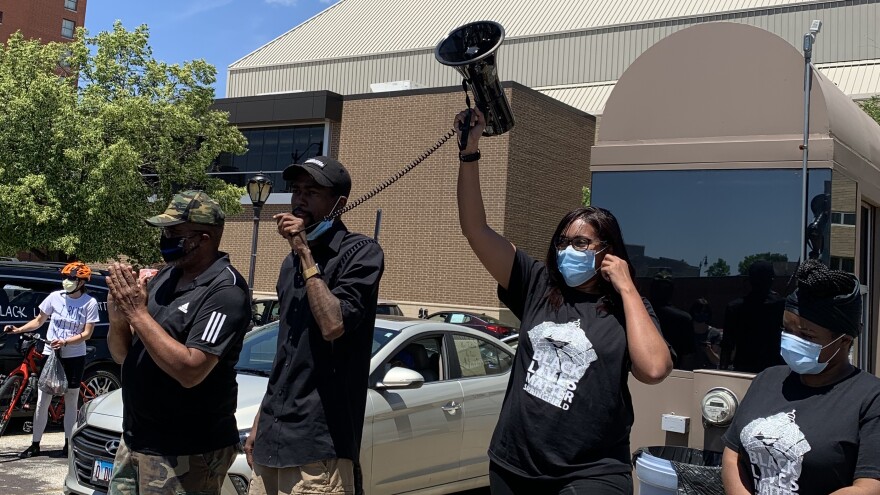After a summer of anti-police brutality demonstrations, two Springfield city council members are proposing a bigger role for the police oversight commission and spelling out use-of-force rules, among other changes.
Ward 2 Ald. Shawn Gregory and Ward 3 Ald. Doris Turner introduced the ordinance (PDF) that outlines nine proposals at Tuesday’s city council meeting. It’s set to come up for debate at the committee meeting on September 29, and could be voted on as early as October 6.
Though the details first became public this week, the proposals already stirred up debate at the meeting and on social media.
"There has always been a community concern about some of the interactions between law enforcement and the community," Turner told NPR Illinois. "I think it's something that is pervasive throughout our country."
Turner said that an act of police violence like the death of George Floyd at the hands of Minneapolis police has not happened in Springfield, but their reforms are proactive. Gregory added that he hoped the measures "advance" the relationship between police and residents.
‘What We Already Do’
The ordinance directs the Springfield Police Department to adopt measures that are similar to rules currently in place for officers. It calls for a ban on the use of neck restraints, chokeholds or carotid holds unless during a deadly force encounter, and a ban use of tear gas, pepper spray, rubber bullets and stun grenades except in certain circumstances, such as during an emergency order by the mayor.
The ordinance also states that deadly force should only be used when “reasonably necessary to prevent death or serious bodily injury as provided by law” and police officers should be trained in crisis intervention and de-escalation techniques on an annual basis.
“I think (the officers are) on board with for the most part, because it's what we already do. We don't need to turn this into something bigger than what it is,” Police Chief Kenny Winslow said at Tuesday’s council meeting.
Winslow published a “Pledge to Professionalism” on the department website last month that shows reforms proposed elsewhere that have already been adopted by the department. He said he plans to talk with his officers about the proposed ordinance and expects most to be supportive.
Turner said she understands some provisions are already in the general orders, but putting them on the books is important.
“Standard operating procedure is part of what an administration puts in place, and administrations change, police chiefs change, mayors change,” she said. “If you have something that's codified in ordinance form, then you have more than just a standard operating procedure. You have what the city is committed to doing.”
Winslow said he isn’t a fan of codifying because then he might have to come back to council to make changes. But he said he’ll “jump through what hoops we have to.”
Winslow said the changes to how the city handles misconduct and instances of excessive force could be more controversial and may prompt a challenge from the police union.
Officer Misconduct Complaints
The ordinance proposes creating a database of officer misconduct and discipline cases. It also calls for forwarding all citizen complaints of misconduct and all complaints of excessive force to the Police Community Review Commission. Right now, only in cases where the Internal Affairs Division has found no wrongdoing on the part of the officer and the police chief doesn’t punish the officer can a citizen appeal the decision the commission.
An NPR Illinois review of the commission’s annual reports and agendas shows it has heard just a single case in the last three years. It’s unclear if it rendered a recommendation.
Turner and Gregory said they’ve heard concerns that the commission is ineffective.
“These are some of the things that the police citizens review commission are supposed to be doing, but it puts all the onus on the community to come to them,” Turner said. “By mandating that these complaints be sent to that commission, it takes that onus off of the community and puts it on officer accountability.”
Gregory agreed and said the city needs to do a better job of promoting that it has a citizen commission.
“We want to make sure we use those processes because if they are broken, or there's some problems within them, that's how we know how we can fix them,” he said.
Initial Reaction
Gregory and Turner said they’re frustrated with the initial response to the reforms, and that many people posted to Facebook and sent them messages criticizing the reforms before the ordinance language was even made public.
Gregory said the reaction was unfair, but similar to how the public, in particular those in law enforcement, often responds to discussion about the police.
“We don't get that chance (to explain) when we touch on this subject,” he said. “Because it's the same thing that plays out a lot of times for these interactions on the street, Black people don't get that opportunity to explain the whole story. They just take whatever and run with it.”
Winslow acknowledged the tension between police and residents in Springfield and across the country, calling it a "tinderbox". He said there have been four instances in the last several weeks of people pulling guns on officers, but none have ended in people dying.
“We're not perfect. We use force. It's ugly,” Winslow said, adding that there is an officer shooting about every two years in Springfield. “But we all have to strive to do better. And that's what we're trying to do.”
Winslow said he has already met with Turner and Gregory about the proposals, and there could be changes to the original language.
Turner said she hoped people would take the time to read the ordinance and bring their concerns to her or Gregory.






